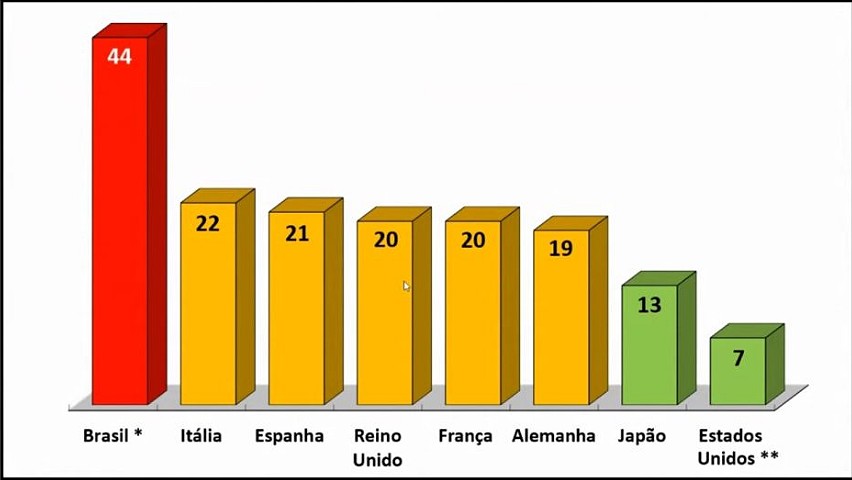Why Are Cars So Expensive in Brazil? An Economic and Automotive Analysis
Why Are Cars So Expensive in Brazil? An Economic and Automotive Analysis. Brazil's automotive market is among the most expensive in the world, leaving consumers wondering why they pay such high prices for vehicles that are significantly cheaper in other countries.
NEWS
Everton Faustino
4/18/20254 min read


Brazil has one of the highest tax burdens on automobiles globally, significantly inflating vehicle prices compared to other countries. The total tax burden on cars in Brazil ranges from 33% to 47% of the final price, making it one of the most expensive places to buy a car.
Why Do Brazilians Pay So Much for Their Cars?
The excessive cost of vehicles in Brazil stems from heavy taxation, a lack of competitiveness in the industry, and high production expenses. Additionally, automakers operating in Brazil tend to apply higher profit margins compared to other markets, capitalizing on limited consumer choices and a suppressed demand. A crucial factor is also the Brazilian preference for larger vehicles like SUVs, which naturally come with higher production costs.
Why Has Brazil’s Domestic Auto Industry Failed?
Brazil has made several attempts to establish a homegrown automotive industry, but efforts have been hampered by insufficient technological investment, logistical barriers, and fierce competition from foreign automakers. Companies like Gurgel, which aimed to manufacture uniquely Brazilian cars, struggled to gain traction due to a lack of government incentives and consumer preference for international brands.
Current Initiatives: Are Brazilian Automakers Making a Comeback?
Despite past difficulties, a few initiatives are working toward the revival of Brazil’s domestic car manufacturing. The Lecar project, for instance, promises to launch a hybrid vehicle in 2026, the Model 459, a compact sedan featuring a 1.0 turbo engine paired with an electric motor. However, Brazil still lacks a fully independent national automaker capable of developing vehicles with entirely local technology and design. The industry remains highly dependent on imported components, which, combined with the dominance of international brands, makes it difficult for Brazilian manufacturers to thrive.
One exception is Agrale Marruá, a robust off-road utility vehicle originally designed for military and security sectors but later embraced in the civilian market. Since its debut in 2004, the Marruá has been exported worldwide, including the Caribbean, where it’s used for adventure tourism. Known for its resilience in extreme terrains, the model has cemented itself as a reference in the off-road sector. Agrale remains one of the few Brazilian automakers to survive against global competition, proving that niche markets can sustain local production when backed by innovation.
What Taxes Are Levied on Car Purchases? How Much Do They Impact Final Prices?
Brazil applies some of the highest car taxes in the world, accounting for 33% to 47% of a vehicle’s final price. These include:
Tax on Industrialized Products (IPI)
Tax on the Circulation of Goods and Services (ICMS)
Financial Operations Tax (IOF)
PIS/Cofins
Additionally, embedded taxation throughout the production chain—on raw materials and labor—creates a cascading effect, effectively taxing taxes and further inflating prices.
Are Production Costs and Labor Driving Up Car Prices?
Yes. Brazil's bureaucratic red tape, poor infrastructure, and expensive labor costs significantly raise production expenses. The country’s inefficient logistics system also contributes to high transportation costs for parts and finished vehicles, further burdening consumers.
While Brazil has a relatively well-trained workforce, particularly in factories following international standards, a lack of consistent investment in innovation and technical training prevents the sector from reaching elite global levels, such as those seen in Germany or Japan. Expensive specialization programs and bureaucratic hurdles make it difficult to refresh the workforce, and the absence of government incentives for R&D further limits technological advancements.
Does Brazil Have the Technology to Manufacture Its Own Cars?
Brazil has the necessary technological capabilities to produce modern vehicles, but it remains heavily reliant on imported components. The strong U.S. dollar directly impacts production costs, making locally assembled vehicles disproportionately expensive. Furthermore, the lack of funding for research and development restricts innovation, preventing Brazil from becoming an autonomous automotive powerhouse.
Is Car Depreciation in Brazil Too High?
Yes. Vehicles in Brazil suffer steep depreciation in their initial years, largely due to high taxation and market perceptions favoring newer models. As a result, consumers lose significant portions of their investment when reselling their cars, further complicating affordability.
Are High Car Taxes a Strategy to Offset Brazil’s Poor Infrastructure?
While there is no official acknowledgment that excessive taxation serves as a tool to curb vehicle demand, some economic experts suggest that Brazil’s tax policies unintentionally achieve this outcome. Brazil's poor road conditions, lack of public transportation investment, and skyrocketing maintenance costs make car ownership increasingly difficult, with tax revenue failing to translate into infrastructure improvements.
Some analysts argue that high car taxes discourage mass vehicle purchases, preventing a deeper urban and highway traffic crisis. In cities where congested roads cannot support growing fleets, taxation may function as an indirect method of controlling expansion. However, instead of overburdening consumers, the ideal solution would be comprehensive investments in infrastructure and transportation networks.
Conclusion: How Can Brazil Lower Car Prices?
Heavy taxation is the main culprit behind Brazil’s exorbitant vehicle prices. Reducing costs would require a comprehensive tax reform, easing levies on the automotive sector while boosting competition and technological innovation. Improving infrastructure and logistics would also significantly cut production expenses, making cars more affordable for Brazilian consumers.
#BrazilianCarMarket #CarPricesBrazil #BrazilianAutomotiveIndustry #HighTaxesBrazil #VehicleTaxation #BrazilianEconomy #AutomotiveSector #ExpensiveCarsBrazil #BrazilianAutoManufacturing #BrazilianImports #CarDepreciationBrazil #InfrastructureBrazil #CarIndustryAnalysis #GlobalAutoMarket #BrazilCarOwnership #BrazilVsUSA #EconomicImpactCars #AutoTechBrazil
https://wradiobrasil.com/por-que-os-carros-sao-tao-caros-no-brasil/
https://www.mobiauto.com.br/revista/por-que-os-carros-estao-tao-caros-no-brasil/6488
https://www.tecmundo.com.br/mobilidade-urbana-smart-cities/265134-carros-caros-brasil.htm
https://noticias.r7.com/prisma/autos-carros/lecar-gurgel-e-democrata-o-que-as-marcas-brasileiras-tem-em-comum-19092024/
https://compraco.com.br/blogs/automotivo/marcas-brasileiras-de-carros-mito-ou-realidade
https://jornaldocarro.estadao.com.br/carros/agrale-marrua-continua-em-producao-e-faz-sucesso-no-turismo/
https://garagemmaster.com.br/um-icone-brasileiro-agrale-marrua/


Agrale Marruá
Type the words below into the Unveiled Brazil search engine to learn more:
CAR
INDUSTRY
AUTOMOBILE
